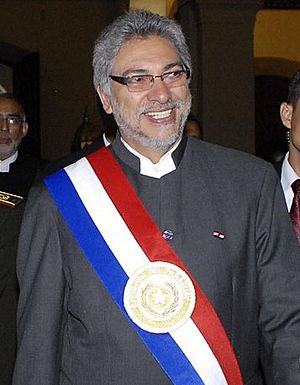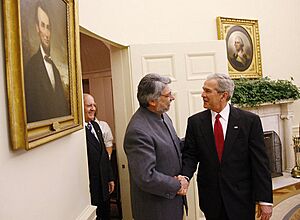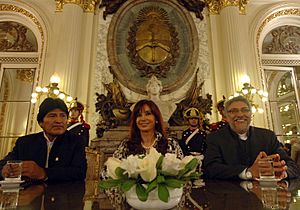Fernando Lugo facts for kids
Quick facts for kids
Fernando Lugo
|
|||||||||||||||||||||
|---|---|---|---|---|---|---|---|---|---|---|---|---|---|---|---|---|---|---|---|---|---|

Lugo in 2009
|
|||||||||||||||||||||
| 48th President of Paraguay | |||||||||||||||||||||
| In office 15 August 2008 – 22 June 2012 |
|||||||||||||||||||||
| Vice President | Federico Franco | ||||||||||||||||||||
| Preceded by | Nicanor Duarte | ||||||||||||||||||||
| Succeeded by | Federico Franco | ||||||||||||||||||||
| President pro tempore of the Union of South American Nations | |||||||||||||||||||||
| In office 29 October 2011 – 22 June 2012 |
|||||||||||||||||||||
| Preceded by | Bharrat Jagdeo | ||||||||||||||||||||
| Succeeded by | Ollanta Humala | ||||||||||||||||||||
| President of the Senate of Paraguay | |||||||||||||||||||||
| In office 30 June 2017 – 30 June 2018 |
|||||||||||||||||||||
| Preceded by | Robert Acevedo | ||||||||||||||||||||
| Succeeded by | Silvio Ovelar | ||||||||||||||||||||
| Senator of Paraguay | |||||||||||||||||||||
| In office 30 June 2013 – 30 June 2023 |
|||||||||||||||||||||
| Personal details | |||||||||||||||||||||
| Born |
Fernando Armindo Lugo Méndez
30 May 1951 San Solano, Paraguay |
||||||||||||||||||||
| Political party | Frente Guasú (since 2010) | ||||||||||||||||||||
| Other political affiliations |
Christian Democratic Party (2007–2010) Patriotic Alliance for Change (2007–2010) |
||||||||||||||||||||
| Alma mater | Catholic University of Our Lady of Asuncion Pontifical Gregorian University |
||||||||||||||||||||
| Signature |  |
||||||||||||||||||||
|
|||||||||||||||||||||
Fernando Armindo Lugo Méndez was born on May 30, 1951. He is a politician from Paraguay. He served as the President of Paraguay from 2008 to 2012. Before becoming president, he was a Roman Catholic priest and a bishop. He was the Bishop of the Diocese of San Pedro from 1994 to 2005.
In 2008, he was elected president. This election was a big deal because it ended 61 years of rule by the Colorado Party. In 2012, he was removed from office through a process called impeachment. Some neighboring countries did not agree with this decision. After his presidency, he was elected to the Senate of Paraguay in 2013 and 2018. However, he did not win reelection in 2023.
Contents
Early Life and Family
Fernando Lugo grew up in Paraguay. He went to a religious school in Encarnación for his early education. He even sold snacks on the streets to help his family.
His family was involved in politics, especially with the Colorado Party. His uncle, Epifanio Méndez Fleitas, was part of a political event in 1954 that helped Alfredo Stroessner become powerful. Later, his uncle disagreed with Stroessner and left the country. Fernando's father was put in prison many times, and some of his older brothers and sisters had to leave the country too.
Becoming a Priest
Fernando Lugo's father wanted him to become a lawyer. But when Fernando was 18, he went to a teaching school. He started teaching in a small village. The people in the village were very religious but did not have a priest. This experience deeply affected him. It made him realize he wanted to become a Roman Catholic priest.
At 19, he joined a seminary, which is a school for training priests. He became a priest on August 15, 1977. After that, he went to Ecuador and worked as a missionary for five years. While in Ecuador, he learned about a way of thinking called liberation theology. This idea focuses on helping poor people and fighting for fairness.
Lugo returned to Paraguay in 1982. He then went to Rome for more studies. In 1987, he came back to Paraguay, two years before the end of the Stroessner government. He became a bishop on April 17, 1994. He was put in charge of the poorest area, the San Pedro diocese.
In 2005, Lugo decided to step down as bishop. He wanted to run for political office. The Church initially said no to his request to leave the priesthood. However, after he won the presidential election, the Church allowed him to officially leave the priesthood on June 30, 2008.
Political Journey
Fernando Lugo became well-known across Paraguay by supporting farmers. These farmers were asking for a fairer way to share land. In 2006, surveys showed that he was a popular choice for president. People called him "the bishop of the poor." He was seen as a big challenge to the Colorado Party, which had been in power for a long time.
Lugo focused on the problem of social inequality in Paraguay. He believed that Paraguay could be a better place. He said he would be there for the poor and those who faced unfair treatment.
Running for President
In February 2007, a survey showed Lugo was the top choice for the 2008 presidential election. More than 37% of voters wanted him. On October 29, 2007, he joined a small group called the Christian Democratic Party. This allowed him to officially become a candidate.
His campaign was supported by many different groups. They formed a team called the Patriotic Alliance for Change. Federico Franco from the Authentic Radical Liberal Party, a large opposition party, became his running mate for Vice President.
Some people questioned if Lugo could legally run for president. The constitution says that religious leaders cannot hold elected office. Also, the Pope had not yet allowed him to leave the priesthood. However, in November 2007, the Colorado Party said they would not object to his candidacy. In July 2008, the Pope officially allowed Lugo to leave the priesthood, which settled the issue.
Becoming President

On April 20, 2008, Fernando Lugo won the election. He received 42.3% of the votes. The Colorado Party candidate, Blanca Ovelar, accepted that Lugo had won. President Nicanor Duarte Frutos also admitted that his party had lost for the first time in 61 years.
Lugo's victory was historic. It was the first time in Paraguay's history that a ruling party peacefully gave up power to an elected opposition leader. He became Paraguay's second president from a left-leaning political group. He was also the first to be freely elected.
Lugo became president on August 15, 2008. He announced that he would not take his presidential salary. He said the money "belongs to more humble people." He also encouraged other politicians to do the same.
One of his first actions was to name Alejandro Hamed as his foreign minister. During his campaign, Lugo had suggested changing diplomatic relations from Taiwan to the People's Republic of China. However, after he became president, he stated that he had no plans to change this.
On August 18, 2008, Lugo appointed Margarita Mbywangi as secretary of indigenous affairs. She was the first indigenous person to hold such a position in Paraguay.
Two of Lugo's main promises were to fight corruption and to improve land distribution. His government started programs to help poor people. These included building affordable homes, offering free treatment in public hospitals, and giving money to Paraguay's poorest citizens.
Government Leaders (Cabinet)
Fernando Lugo chose many people to help him run the country. Here are some of the important roles and the people who held them:
- Minister of Foreign Relations: Alejandro Hamed Franco, Hector Lacognata, and Jorge Lara Castro
- Minister of Finance: Dionisio Cornelio Borda
- Minister of Internal Affairs: Rafael Filizzola
- Minister of National Defence: Luis Bareiro Spaini, Cecilio Pérez Bordón, and Catalino Luis Roy
- Minister of Agriculture and Livestock: Cándido Vera Bejarano and Enzo Cardozo
- Minister of Industry and Commerce: Martín Heisecke
- Minister of Justice and Labor: Blas Llano and Humberto Blasco
- Minister of Public Works and Communications: Efraín Alegre and Cecilio Pérez Bordón
- Minister of Public Health and Social Welfare: Esperanza Martínez
- Minister of Education and Culture: Horacio Galeano Perrone, Luis Riart, and Víctor Ríos
- Minister of Women: Gloria Godoy de Rubin
- General Secretary of the Presidency: Miguel Ángel López Perito
- Secretary of Public Function: Lilian Soto and José Tomás Sánchez
- Secretary of Technical Planification: Carlos Sánchez and Bernardo Esquivel Vasken
- Secretary of the Environment: José Luis Casaccia
- Secretary of Social Action: Paulino Cáceres
- Secretary of Culture: Ticio Escobar
- Secretary of National Emergency: Camilo Soares and Gladys Mercedes Cardozo Zacarías
- Secretary of Childhood and Adolescence: Liz Torres
- Anti-drugs National Secretary: César Damián Aquino
- Director of the National Indigenous Institute: Margarita Mbywangi
Removal from Office
On June 15, 2012, a serious event happened. Seventeen people died in a conflict between farmers and police. This event was used as a reason to start an impeachment process against Lugo.
On June 21, 2012, the Chamber of Deputies voted to remove Lugo from office. They mentioned the conflict, as well as concerns about safety and other issues. The next day, the Senate also voted. The final vote was 39 to 4 to remove Lugo. This ended his time as president, and Federico Franco became the new president.
Lugo said he would challenge the decision. He felt he did not have enough time to prepare his defense. Many presidents from neighboring countries did not agree with Lugo's removal. They compared it to a "coup d'état," which means a sudden, illegal takeover of power. Leaders from Brazil, Argentina, Ecuador, and the Dominican Republic said they would not recognize Federico Franco as the new president.
Fernando Lugo accepted his removal. He said that any chance to get his position back ended when the Supreme Court of Paraguay confirmed his removal. However, he still called it a "congressional coup." Despite this, many polls show that he is considered one of the best presidents in Paraguay's recent history.
Senator for Paraguay
In the 2013 election, Fernando Lugo ran for a seat in the Paraguayan Senate. He was elected as a senator, representing the left-wing group called Frente Guasú. He served in the Senate until 2023.
Awards and Recognition
In March 2011, Fernando Lugo received the Order of Brilliant Jade. This award was given to him by Ma Ying-jeou, who was the President of the Republic of China (Taiwan) at the time.
Personal Life
During his time as president, Fernando Lugo was not married. So, he chose his older sister, Mercedes Lugo, to serve as the First Lady of Paraguay.
In August 2010, Lugo was diagnosed with a type of cancer called non-Hodgkin lymphoma. He continued his duties as president while receiving treatment for his illness. He also studied at the Pontifical Gregorian University in Rome.
See also
 In Spanish: Fernando Lugo para niños
In Spanish: Fernando Lugo para niños
 | Selma Burke |
 | Pauline Powell Burns |
 | Frederick J. Brown |
 | Robert Blackburn |


